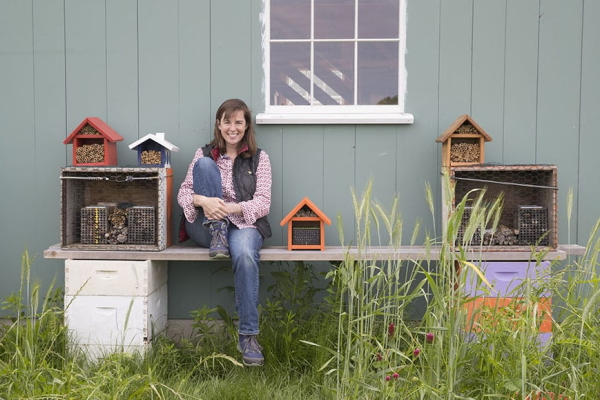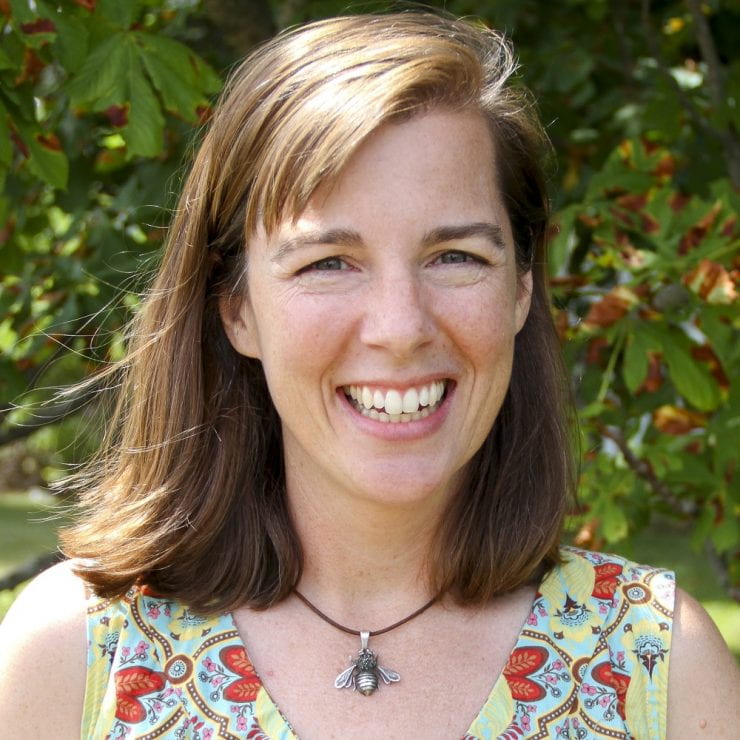Laura Klahre (MS, 1997)

Laura Klahre ’97 speaks for the bees.
As a bee rancher and the owner of Blossom Meadow Farm on the North Fork of Long Island, no one understands the importance of pollinators more than Klahre. That’s why she works hard to educate the public on creating friendly environments for bees.
But not all bees are created equal. While recent headlines have drawn attention to honey bees, the School of Marine and Atmospheric Sciences alumna is working hard to shift attention to Long Island’s native pollinators, including mason bees and bumblebees, both of which pollinate two to three times better than the invasive honey bee.
As a School of Marine and Atmospheric Sciences graduate, you began your career as an oceanographer. What inspired your career change to bee rancher and berry farmer?
Life is definitely a meandering path but the leap from oceanography to farming is not as gigantic as one would think. Similar ecological principles for healthy ecosystems apply on land and underwater. For example, biodiversity is critical for a stable ecosystem when dealing with the fisheries in the Atlantic, the resiliency of a coral reef, and even for a self-sustaining farm. To this end, we maintain a tract of grassland and natural areas for native pollinators to live, follow organic growing principles, ensure multiple flower species are blooming throughout the growing season, turn off the lights at night (moths pollinate), and no longer keep honey bee hives.
You’re currently working to ban honey bee hives from protected lands. Can you tell us more about why this is such an important initiative? How are honey bees impacting our ecosystem?
 Declining honey bee populations have gripped the headlines and unfortunately spurred
many land managers to allow hives on protected lands. Receiving a fraction of the
media attention, native bee populations have been hit even harder and are ecologically
more important. A multitude of papers have shown that honey bees outcompete native
bees for food, change the ecosystem by preferentially pollinating invasive weeds,
and can transmit pathogens and parasites to native bee species. Honey bee hives should
be banned from parklands and open space in order to protect resident native bee populations
and overall ecosystem health.
Declining honey bee populations have gripped the headlines and unfortunately spurred
many land managers to allow hives on protected lands. Receiving a fraction of the
media attention, native bee populations have been hit even harder and are ecologically
more important. A multitude of papers have shown that honey bees outcompete native
bees for food, change the ecosystem by preferentially pollinating invasive weeds,
and can transmit pathogens and parasites to native bee species. Honey bee hives should
be banned from parklands and open space in order to protect resident native bee populations
and overall ecosystem health.
In a similar vein, sustainability programs should not teach beekeeping. In light of the most recent research findings, beekeeping should only be taught as part of an agricultural program. Honey bees should be seen as livestock and appropriate to pollinate large scale, single crop agriculture where pesticides are heavily relied upon, there is little to no natural habitat set aside and pollinator availability is a problem.
You mentioned the importance of learning about sustainability practices. How has Stony Brook prepared you for your work today?
Before my first day of graduate school, I had never been to Long Island. Yes, I grew up on the shore of New Jersey and had been to New York City several times, but never to Long Island. Once you find your groove, it is a fascinating place! Although close to an urban center, nature still abounds and the North Fork of eastern Long Island still has strong agricultural underpinnings. Sustainable agricultural practices are critical for nutritious crops, bountiful yields, and for a healthy environment.
My graduate years at Stony Brook University were hard, but the research and classes prepared me for this path forward. I love reading journal articles about native pollinators (Dr. John Ascher and Dr. Bryan Danforth are two of my favorites) and figuring out how to take the science and bring it into practice. For example, deformed and misshapen fruit likely results from a pollination problem. Native bees, like mason bees and bumblebees, pollinate 2-3 times better than the non-native invasive honey bee. Science has shown that more complete pollination of a flower results in heavier, higher quality fruit and thus a higher crop yield per acre. We started ranching mason bees on our farm years ago and now over 150 people have started with mason bees through us (one can sign up for our newsletter through blossommeadow.com). Although I kept honey bees since the late 1990’s, those hives are now gone.
Tell us more about your work at Blossom Meadow Farm.
We are a small farm in Southold, NY focused on growing premium berries, making great jam, and raising mason bees. We are particularly well known for our award-winning red raspberry and strawberry jams. We don’t use commercial pectin to make jam. Instead, the jam is thickened by allowing the fruit to slowly reduce, coaxing out the fruit’s vibrant flavors and natural pectin.
Our tagline is Eat Jam, Save Nature. Jam sales support the farm as well as our side conservation initiatives with monarch butterflies, nocturnal pollinators, and now carbon sequestration efforts by growing and planting oak trees.
What does a typical day look like for you?
My husband, Adam Suprenant, is a winemaker, and together we co-own the winery Coffee Pot Cellars (named for the Orient Point Lighthouse, which sailors call the “Coffee Pot”). Blossom Meadow Farm shares retail space with the Coffee Pot Cellars Tasting Room in Cutchogue. A typical day during the warm months entails picking fruit in my pajamas while listening to an audiobook. At 11 am, my black pug Beasley and I zoom down the road about three miles to open up the tasting room. We pour wine and talk conservation all day and then head back to the farm at 6 pm to pick more fruit until dark. We are closed on Tuesdays and Wednesdays so that I can make jam.
How about a typical day off?
With the farm in full production, there really is no day off but I love what we do. One of the clear benefits to living on Long Island though is that there is always a beach within bicycling distance to take a quick dip.
In your 2015 TED Talk, you spoke about the critical role that bees play in food production. What is one thing you wish everyone knew about native pollinators?
Planting bee-friendly plants adds color to your landscape AND helps reconnect Long Island’s fragmented natural areas to form larger more diverse ecosystems. Planting bee-friendly plants, shrubs, and trees creates a vibrant wildlife corridor for bees, butterflies, birds, and other creatures. Instead of driving somewhere to see nature, you can bring nature to your doorstep.
For more information on bee-friendly plants, Laura Klahre and Blossom Meadow Farm, please visit blossommeadow.com or follow them on Instagram and Facebook.
Learn more about how Stony Brook is building a bee-friendly campus.
--Kristen Temkin Brennan
